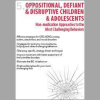-
×
 Couples on the Brink: When Is Enough Enough? By Terry Real - PESI
1 × $23.10
Couples on the Brink: When Is Enough Enough? By Terry Real - PESI
1 × $23.10 -
×
 Ethics & Cultural Competency: 1-Day Intensive Certificate By Frances Patterson - PESI
1 × $23.10
Ethics & Cultural Competency: 1-Day Intensive Certificate By Frances Patterson - PESI
1 × $23.10 -
×
 Advances in Motor Control and Learning for Neurological Rehab By Ben Sidaway - PESI
1 × $23.10
Advances in Motor Control and Learning for Neurological Rehab By Ben Sidaway - PESI
1 × $23.10 -
×
 Transgender & Gender Non-Binary (TGNB) Clients: Clinical Issues and Treatment Strategies By lore m dickey - PESI
1 × $23.10
Transgender & Gender Non-Binary (TGNB) Clients: Clinical Issues and Treatment Strategies By lore m dickey - PESI
1 × $23.10
Oppositional, Defiant & Disruptive Children & Adolescents: Non-Medication Approaches to the Most Challenging Behaviors by Scott D. Walls
$199.00 Original price was: $199.00.$23.10Current price is: $23.10.
SKU: C55vip.11239z8scg5L8
Category: Download
Tags: Defiant & Disruptive Children & Adolescents: Non-Medication Approaches to the Most Challenging Behaviors, Oppositional, Scott D. Walls
Understanding oppositional, defiant & disruptive children and adolescents: Non-medication approaches to the most challenging behaviors – Digital Download!

Oppositional, Defiant & Disruptive Children & Adolescents: Non-Medication Approaches to the Most Challenging Behaviors by Scott D. Walls
Overview

Understanding Oppositional, Defiant, and Disruptive Behaviors in Children and Adolescents: Non-Medication Solutions for Managing the Most Challenging Behaviors
Managing oppositional defiant disorder (ODD) and disruptive behaviors in children and adolescents can be an overwhelming task for parents, educators, and therapists. In Oppositional, Defiant & Disruptive Children and Adolescents: Non-Medication Approaches to the Most Challenging Behaviors, Scott D. Walls offers a valuable resource filled with insights and strategies to help address these behaviors without relying on medication. This work not only examines the root causes of defiance and opposition but also offers practical tools, such as assessments, exercises, and case studies, which cater to various stakeholders involved in the care and education of children struggling with these challenges.
Through this exploration, we will highlight key elements of Walls’ work, the approaches it presents, and how they can be applied effectively in everyday scenarios. Additionally, we will evaluate the book’s impact on the community of caregivers and educators who encounter these behaviors regularly.
Unpacking the Root Causes of Oppositional and Defiant Behaviors
A central aspect of Scott D. Walls’ book is its thorough analysis of the causes behind oppositional and defiant behaviors. Understanding these factors is vital for caregivers and educators, as it helps them identify the triggers that may lead to confrontational behaviors. For many children with ODD, these behaviors stem from a deep sense of frustration, inadequacy, or a strong desire for autonomy and control. Walls explores psychological and environmental factors that may worsen these behaviors and stresses the importance of recognizing the specific circumstances in which these defiant actions arise.
Factors Influencing Defiance
-
Family Environment: The interactions and relationships within the family can significantly influence a child’s behavior. Stressful home dynamics or inconsistent parenting approaches may contribute to defiant actions.
-
School Setting: Schools that lack adequate behavioral health support or have inflexible disciplinary policies may aggravate ODD symptoms, leading to increased defiance.
-
Social Influences: Peers and broader societal norms can also shape behaviors, especially when a child faces negative social influences or bullying.
By identifying these factors, caregivers can adjust their responses to create a more supportive atmosphere that reduces defiance and encourages positive behavior.
Non-Medication Strategies for Managing Defiant Behaviors
A standout feature of Walls’ work is its emphasis on non-medication strategies. Focusing on behavioral management techniques, Walls offers alternatives for dealing with ODD and similar challenges, emphasizing the significance of intervention in both home and school environments.
Core Non-Medication Approaches
-
Behavioral Management Techniques: The book outlines a variety of approaches aimed at reinforcing positive behaviors while minimizing negativity. Strategies like positive reinforcement, clear routines, and open communication can significantly enhance compliance and make children feel heard and understood.
-
Crisis Prevention Planning: Walls emphasizes the importance of having a clear crisis plan in place. This plan should outline steps to follow during behavioral crises and assign specific roles to caregivers and educators.
-
Skill Building: Teaching emotional regulation and problem-solving skills helps children express frustration and resolve conflicts in healthier ways. The book includes activities designed to develop these essential skills.
-
Positive Interaction: Engaging children in a positive and constructive manner can have a lasting impact on their self-esteem. This section provides insights into how personal interactions and activities can boost self-worth and foster better relationships.
By applying these strategies, caregivers and educators can create environments that nurture growth while minimizing disruption, making learning spaces more conducive to development.
Real-Life Case Studies and Practical Tools
One of the defining elements of Walls’ book is its use of real-world case studies and practical exercises that illustrate the effectiveness of the proposed strategies. These examples help readers see how to apply theoretical concepts in practice, improving understanding and retention of the material.
Application of Theoretical Concepts
-
Case Studies: Each case study in the book reflects actual scenarios encountered by children, parents, and educators. For instance, one case focuses on a child with disruptive behavior in school settings, showing how the introduction of structured routines and consistent discipline led to a marked reduction in behavioral incidents over time.
-
Exercises and Assessments: The book includes tailored exercises to help caregivers identify specific triggers and responses in children. These exercises allow for more personalized strategies that meet the individual needs of each child.
-
Guidelines and Frameworks: Walls provides clear guidelines for caregivers to develop their own intervention frameworks. These structured outlines ensure strategies remain effective and adaptable, with steps for evaluation and adjustment as children’s needs evolve.
Target Audience and Broader Community Impact
Oppositional, Defiant & Disruptive Children and Adolescents is a resource that speaks to a broad audience, addressing the needs of various stakeholders involved in the care and management of children with challenging behaviors. Whether the reader is a therapist, educator, or parent, Walls offers tailored advice for each group.
Engagement Across Diverse Stakeholders
-
Therapists: In clinical settings, therapists can benefit from the comprehensive strategies offered, tailoring them to individual therapy sessions while considering the child’s broader environment.
-
Educators: School staff can integrate non-medication approaches into their classroom management strategies, promoting inclusive learning environments that reduce behavioral challenges.
-
Parents and Caregivers: Parents seeking to understand and manage their children’s behaviors gain valuable insights they can apply at home, enhancing family dynamics and improving outcomes for their children.
By catering to multiple audiences, Walls ensures that his work has a far-reaching impact across communities facing ODD and other disruptive behaviors.
Conclusion
In conclusion, Oppositional, Defiant & Disruptive Children and Adolescents: Non-Medication Approaches to the Most Challenging Behaviors by Scott D. Walls stands as a crucial resource in behavioral management. By addressing the underlying causes of defiant behaviors, offering non-medication strategies, and providing relevant case studies, the book presents a comprehensive framework for managing challenging behaviors without the need for medication. The insights shared in this resource serve as a beacon of hope for parents, educators, and therapists seeking to foster positive behavioral changes and emotional well-being in children and adolescents dealing with ODD and similar conditions. Embracing these strategies can lead to improved interactions, better educational outcomes, and a more supportive environment for all involved.
Frequently Asked Questions:
Business Model Innovation: We operate a group buying strategy, allowing participants to share costs and access popular courses at reduced prices. This model benefits individuals with limited financial resources, despite concerns from content creators about distribution methods.
Legal Considerations: The legality of our operations involves complex issues. Although we don’t have explicit permission from course creators to resell their content, there are no specific resale restrictions stated at the time of purchase. This ambiguity creates an opportunity for us to provide affordable educational resources.
Quality Control: We ensure that all course materials purchased are identical to those offered directly by the creators. However, it’s important to understand that we are not official providers. As such, our offerings do not include:
– Live coaching calls or sessions with the course author.
– Access to exclusive author-controlled groups or portals.
– Membership in private forums.
– Direct email support from the author or their team.
We aim to reduce the cost barrier in education by offering these courses independently, without the premium services available through official channels. We appreciate your understanding of our unique approach.
Be the first to review “Oppositional, Defiant & Disruptive Children & Adolescents: Non-Medication Approaches to the Most Challenging Behaviors by Scott D. Walls” Cancel reply
You must be logged in to post a review.

















Reviews
There are no reviews yet.